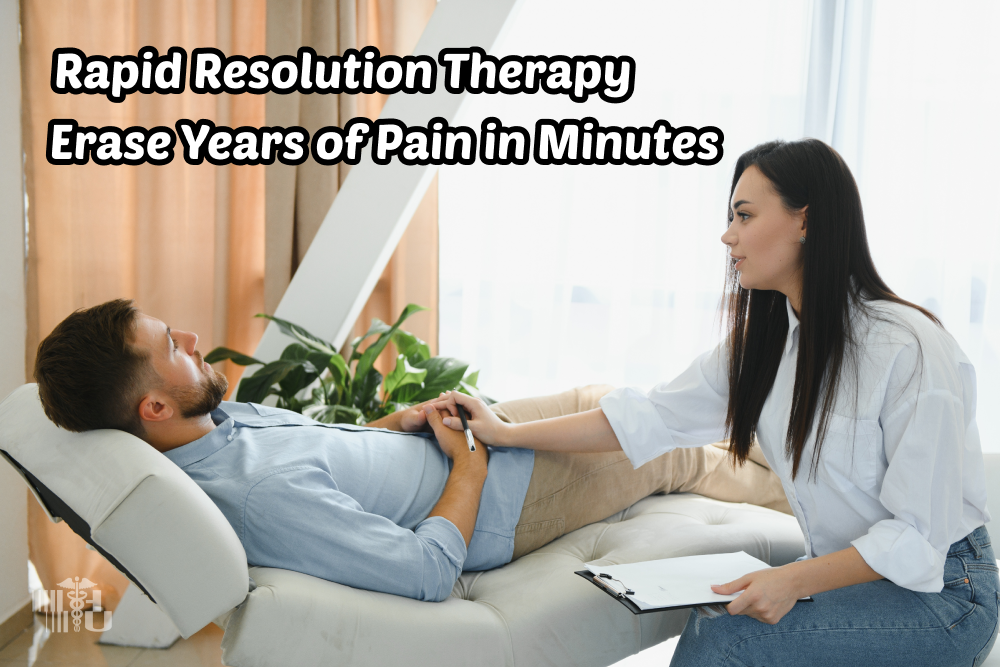For many individuals, the past is never truly left behind. Unwanted memories resurface without warning, bringing with them Stress, Anxiety, and Depression. Even in the middle of joyful moments, unresolved trauma can cast a long shadow. If this sounds familiar, you’re far from alone. Millions of people worldwide live with the weight of trauma and PTSD, often feeling trapped in a cycle they can’t break.
In the field of Mental health and Behavioral health, treatment approaches continue to evolve. One such breakthrough method, Rapid Resolution Therapy (RRT), is helping people release emotional pain faster than they believed possible, offering a safe, gentle, yet powerful way to create lasting change.
The Challenge of Trauma: A Locked Room in the Mind
Trauma can feel like being trapped behind a locked door. Locked inside are memories—some crystal clear, others buried deep—that cause insomnia, flashbacks, irritability, and a loss of joy. Traditional mental health care typically involves visits to a psychiatrist who manages medications, such as SSRIs like sertraline or paroxetine, to balance brain chemistry and soften symptoms of anxiety and depression. However, medication alone often soothes without unlocking the emotional hold trauma has on the subconscious mind.
Meanwhile, psychologists, therapists, and behavioral health specialists use talk therapies—like Cognitive Behavioral Therapy (CBT) and Dialectical Behavioral Therapy (DBT)—to help patients confront their trauma. These methods can be transformative but may require months of revisiting painful memories, which is often emotionally draining.
When Hope Feels Out of Reach
Consider the story of Sarah, a resilient, compassionate woman who faced a life-altering event years ago. She sought help the way many do:
- Her psychiatrist adjusted medications to stabilize her mood.
- She met regularly with a psychologist for mental therapy sessions.
- She practiced coping skills recommended by her therapist.
While these resources provided relief, they didn’t erase the heavy emotional pull of her memories. Anxiety interrupted her sleep, depression dulled her days, and stress often left her feeling drained. Each therapy session seemed to circle back to the same painful scenes, and she feared she would never truly move forward.
What Makes Rapid Resolution Therapy Different?
Rapid Resolution Therapy is a specialized therapeutic approach designed to address the root of emotional distress. What makes RRT different from other behavioral health treatments is its focus on clearing the impact of trauma swiftly, without forcing clients to relive past events in detail.
Rather than months or years of revisiting the same story, RRT can often bring a significant shift in just a few sessions. By integrating aspects of psychology, guided imagery, and Clinical Hypnosis, RRT works directly with both conscious and subconscious thought patterns.
For clients like Sarah, this means they can release intense emotions connected to the trauma without the exhaustion of re-experiencing it.
The Role of the Therapist
The success of RRT lies largely in the skill of the therapist. In this process, the therapist becomes more than a listener; they serve as a navigator, helping guide the client’s mind toward clarity.
Through carefully chosen words, storytelling, and symbolic imagery, the therapist reframes how the brain perceives old experiences. This is not about denying the trauma happened; rather, it’s about altering the way the mind stores and responds to the memory.
For Sarah, her therapist’s approach meant she was no longer in the traumatic moment when she thought about it. It became a past event—like an old photograph—rather than a current wound.
Inside the RRT Process
Every RRT session begins with trust and comfort. Many traditional psychiatric approaches focus on medication management to stabilize mood and reduce symptoms, but in RRT, the conversation itself becomes the core treatment tool.
While the client is guided into a state of calm concentration, the therapist uses language to “update” the way the mind processes the memory. This “update” allows the brain to recognize that the danger is over, releasing the emotional alarm signals that fuel stress, depression, and anxiety.
The effects can feel immediate—Sarah noticed a reduction in her anxiety after her very first session.
How RRT Differs from Other Treatments
Traditional psychiatric care, counseling, and behavioral therapies each play an important role in mental health care—and for many, a combination provides the best results. The difference with RRT is in its efficiency and emotional gentleness:
- No retraumatization: Clients don’t have to relive events in graphic detail.
- Rapid results: Many report feeling lighter within just a few sessions.
- Integration-friendly: Can complement existing medication and counseling plans.
Sarah’s psychiatrist observed her growing resilience and was able to adjust her medications accordingly, reducing what she no longer needed while supporting her overall behavioral health.
Beyond PTSD and Trauma: Lasting Change
While RRT is particularly effective for trauma and PTSD, it is also being used for a variety of emotional challenges—grief, anxiety, depression, and even certain phobias. Its adaptability and speed make it appealing for clients who have tried multiple therapies with limited success.
For Sarah, the transformation was clear. Crowded spaces no longer triggered fear. Stress felt manageable, and joy returned to her daily life. Most importantly, she no longer saw herself as “the person who was damaged by trauma,” but as someone free to define her future.
The Power of Collaboration
Successful mental health care often comes from combining the skills of multiple professionals.
- The psychiatrist ensures medical stability and safe medication management.
- The psychologist provides ongoing insight and coping strategies.
- The therapist trained in RRT delivers targeted, trauma-clearing work.
Together, these roles create a supportive safety net for recovery.
Final Thoughts: A Future Without the Weight of the Past
If you or someone you care about is navigating the challenges of trauma, PTSD, or persistent emotional struggles, know that there are options beyond simply “managing” symptoms. Rapid Resolution Therapy offers an innovative, client-centered pathway that has helped people find relief faster than they ever imagined.
It’s not about forgetting—it’s about feeling free again.
If you’re ready to explore life beyond the burden of old memories, consider seeking out a licensed mental health therapist trained in RRT. The journey to emotional freedom may be shorter than you think, but its benefits can last a lifetime.
Harmony United Psychiatric Care across Florida is a leading mental health clinic that provides trusted psychiatric care for your undefined needs. To get personalized and secure solutions for your mental health conditions, like stress, anxiety, depression, bipolar disorders, ptsd, ocd, and eating disorders. We understand your psychological problems, which is why we provide telepsychiatry services to ensure your privacy and security.
For more information about mental health conditions, visit our Mental Health Library page. To understand and cope with your major depressive disorder symptoms, get help from our top psychiatrists, psychologists, and therapists, who are known for providing the best Psychological health treatment and psychiatry services. To book an appointment, please call us at (800) 457-4573 or submit an appointment request.



Leave a Reply